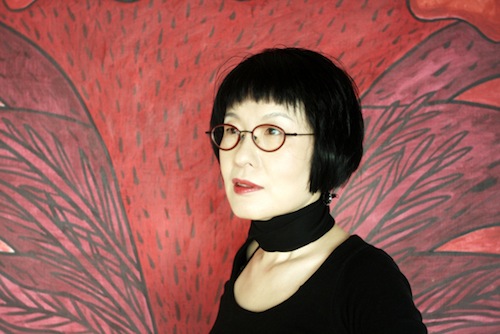“Is / anyone alive?" Please Read This Interview with Kim Hyesoon
"The Female Grotesque" is a seriously great interview with South Korean poet Kim Hyesoon -- read it all here at Guernica. More about her, from Ruth Williams:
[F]or Kim Hyesoon, poetry engages directly in a political struggle in which Korean women articulate a “new voice” that allows them to inhabit multiple and fluid identities free of restrictive gender norms. It’s an incredibly powerful tool in women’s struggle for equality because it is only the “language of [a] poetry that has schizophrenia” that can force the “father language down from power.”
While Kim Hyesoon’s poetry certainly has much to offer women poets and readers interested in feminism, her work also presents a unique voice coming out of the landscape of a fully industrialized, globally ascendant South Korea. In light of the ongoing military and economic ties between South Korea and the U.S., such a voice is worth examining. Regardless of gender or national identity, the allure of Kim Hyesoon’s poetry lies in its enjoinder that we embrace the differences we embody even if these aspects of ourselves are maligned by culture at large. “If someone asks,” she writes, “Is / anyone alive? Break, your, head, open, and, show, your, ten, ta, cle.”
Given the powerful imagery, language, and experimentation that typifies her work, Kim Hyesoon is one of the foremost Korean poets today. Among the first women to begin publishing in Korean literary journals in the late 1970s, Kim’s work has earned her numerous accolades. . . .
And a sample of their conversation:
Guernica: Your poetry is grotesque, asserting a kind of violent ugliness that disrupts the poem’s surface, seemingly offering an open challenge to those who might assert that women must write only about “pretty” things. What draws you to this?
Kim Hyesoon: We carve on our body what society teaches us and continue this task, not knowing the identity they force us to have. This identity is carved on our faces and our skins. Not knowing our bodies have become “the paper made of human meat,” we stuff our bodies and make them a theater where cultural symbols or suppressed symbols play. It is not possible to explain women’s poetry until you sympathize with how women painfully go through the experience of having these tattoos carved on their bodies. At this point, women’s language is the butcher’s language who sells his or her body. It is grotesque and miserable. Female poets can finally step into the world of language after crossing this river of the grotesque; the words cannot gush out of their mouths until they cross the river of screams where you witness death like everyday affairs.
I also came to grotesque language in the patriarchal culture under the dictatorship. The body that was broken into pieces is a sick body. I put the disease of this world and my sick body together. The grotesque in my poems is the motion I use to put myself and the grotesque world together. So the miserable images I use in my poems are the same as the letters I send into the miserable world.
I went to an international poetry festival in Rotterdam, Netherlands recently. I heard one poet saying that poets are healthy people and poets talk to the world through their health. When I heard them saying that, I wondered who judges which one is healthy or not? In my opinion, poets talk through the symptoms of disease. These symptoms of disease are predictions, screams, and songs.
Hyesoon also discusses speaking through these symptoms, attending a candlelight demonstration against the government, confronting the traditional lyric poetry of South Korea, the visceral human body in her work, and the intersection of feminism and poetry:
Specifically, I think the self who writes poetry is different from the self who makes a claim about abolishing the wage differences between men and women. Since the boundary of the world of poetry is fluid, the language in it is also fluid. Hence, the language that is outside of the poetry world, namely the language that is not the language of poetry, cannot go into the poetry world.
Also read about the current state of feminism in South Korea ("Currently, Korean feminism is on the brink of death"), modern male poetry in Korea and "the prison of metaphor," and more more more here.
Montevidayo's Johannes Goransson is also excited about the interview. He leads us to some of Hyesoon's poems as well. Find them here.



